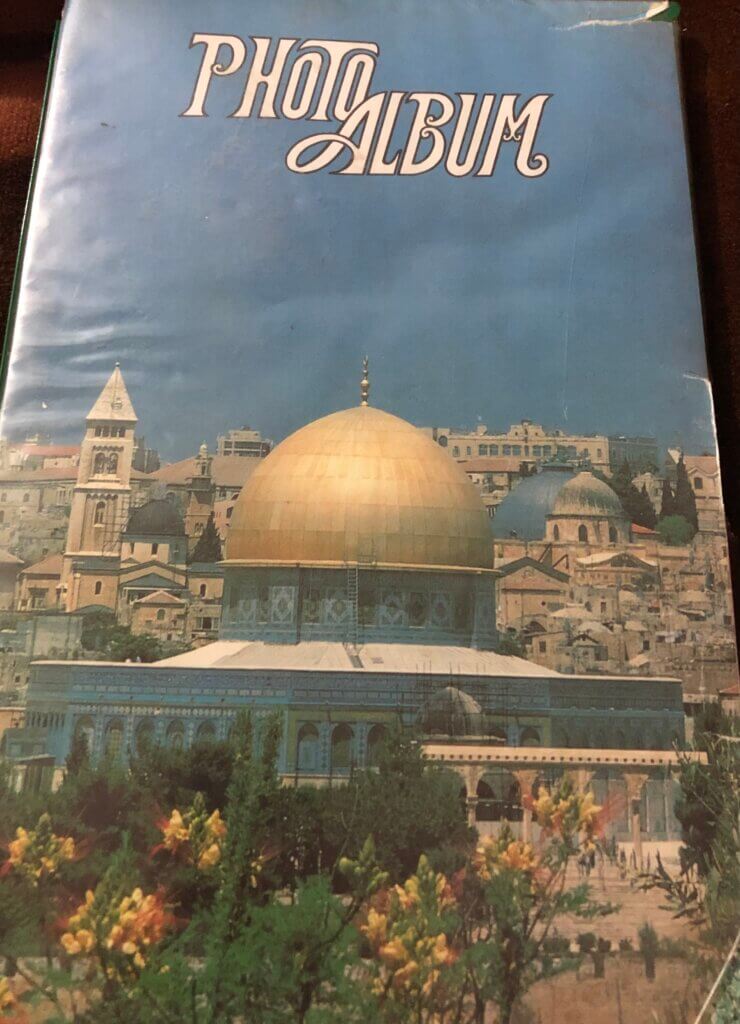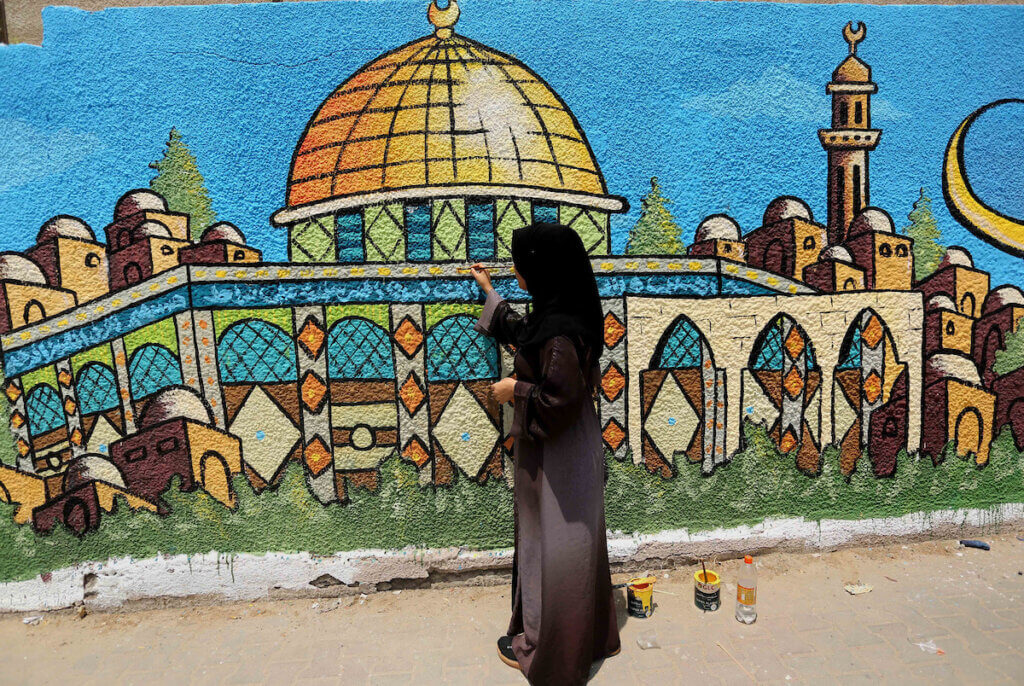Dozens of pictures are scattered around. The antique photo albums are on the chair. My niece, Sahar, 3, recognizes her father in the pictures excitedly. I started collecting the pictures and looked at the younger version of my parents, visiting all sorts of places in occupied Palestine.
The pictures are my only window to a Palestine I have never seen.
“In occupied Palestine,” is handwritten on the back of a picture of my mom from a trip her school organized 35 years ago.
My mom visited occupied Palestine many times in the 1980s. And she has told us countless stories about Grandfather taking them on tours to visit Nablus’s mountains, Jaffa’s beaches, and Beersheba’s beautiful streets.
I have never been to any Palestinian cities other than Gaza, where I was born and was raised, and am now besieged.
Yet, in a deep place in my heart, I yearn to be there to play with friends, to run in the fields, and to breathe Palestine.
I desperately want to take pictures in all Palestinian cities and to feel Palestinian. I need to collect memories from each trip to excitedly brag to my kids about the sweet experiences I lived. For now, I feel I am 10% Palestinian.
As I turned to the photo album I pondered about the person I could have been in a free Palestine. Mom interrupts my train of thought.
“Dad rented me a camera for the trip. He taught me how to use it, so I photographed myself there in a Palestine we don’t always see. All of this ended after the First Intifada in 1987, so we were not able to visit any of Palestine outside Gaza,” Mom explains.
I, for sure, know that there are countless pictures and videos of Palestine on the internet. But I need to feel myself closer to the land. Knowing that my mom was once there lightens my homesickness.
“It was winter, and the day was shorter than we needed to visit more places. We visited only two places: a park and a zoo,” Mom continues.
‘Ah, mom, you could have taken more pictures of the place itself, not the animals. I want to see Palestine then!’ I think.
Eleventh of January, 1985: picture number 16:

It is 2022. If I could go on the long-awaited journey, I would choose a long sunny day, plan a list of destinations to visit, and get more than one camera.
“The camera Dad rented for me has only 28 pictures; there was no cellphones nor Snapchat to capture every view as you always do nowadays.” Mom read my mind again.
The Right to Travel
The UN Convention guaranteeing the freedom of movement declares in article 13:
“Freedom of movement is a human rights concept encompassing the right of individuals to travel from place to place within the territory of a country and to leave the country and return to it.”
Palestinians in Gaza are prevented from visiting Palestine, or even praying in Jerusalem. And if you are ‘lucky’ enough to have the permit to visit, you will have to be repeatedly “checked.” Although mom was lucky, she felt robbed of the land on her way.
“The long way to our destination was filled with cypress and orange trees, and the vast areas extended as far as the eye could see. Throughout the whole way, I complained to myself: ‘They stole this beauty!'” Mom describes.
I nod as she continued her descriptions.
I thought how a trip like this has been one of my life dreams: the ride along the way, to commune with nature, to listen to my favorite list of songs, and to sing Sabbal Oyouno, Wein A’a Ramallah, Zareef AlToul.
Susan Abulhawa’s poem Wala flashes through my mind:
You ride
The country they stole from you
Seeds outside your window
And you imagine
The man you would have been
The man you should have been
Out there
In a Palestine
Un-raped
Un-stolen
If only we were nurtured in a Palestine unoccupied. If only we did not call the sick who go to Jerusalem for medical treatment “lucky.” If only the landowner could visit the land freely.
In her poem Jerusalem, Sara Ali calls the white European Israeli soldier “lucky” for staying in Jerusalem.
In Jerusalem, where I am a visitor with a permit.
Guess what? You cannot even get that permit unless you are dying, or older than 55 years old . . . if you live until that age.
Then, I check the distance between Gaza and Jaffa, where I am originally from. It is only 175.9 km far round trip, which means 2 hours and 18 minutes by car.
It is humiliating and unfair to be that close to your dream city, yet not being able to visit. Again, as Sara Ali describes in Jerusalem:
Home, for a moment, seems so close
And yet so, so far away
Jerusalem
“There were times when I had my breakfast in Gaza, traveled by bus to Haifa, had lunch in Haifa, and had dinner in Jaffa,” Dad comments.
“What about, Jerusalem?” I ask.

“For years, I used to go every Friday to Jerusalem for praying,” Dad excitedly answers.
Grumbling, Mom says, “I went only once after taking permission to visit it in the late 90s. I wish I could have visited it more.”
Jerusalem is not that far from Gaza. It is only 78 km away, an hour and a half by car. Still, Gazans are not allowed to pray in Al-Aqsa or to eat Jerusalem’s hot ka’k.
The vivid description of Jerusalem’s beauty charms me every time my parents start describing it. My siblings and I will gaze and listen for hours of their adventures.
“Living in an open-air prison, yet deprived of seeing Jerusalem for more than 22 years, it hurts. Especially for a girl whose favorite hobby is traveling while she had never stepped out of the strip. This is a tragicomedy,” I complain.
“It also does hurt when you visit it only for work. No relaxing, then,” dad concludes.
“At least, you did, Dad.” I silently whisper.
Relieved, I gaze into the pictures but the antique photo albums fall onto the ground. I think they are fed up with all the feelings of longing, homesickness, and nostalgia.
“Quds, isn’t it, Aunt?” little Sahar asks.
“Yes,” I smile.
Maybe she recognizes her father’s photos well now. And she will soon recognize her homeland. It is time for her to start missing it.



This is so sad, heartbreakingly beautiful. Thank you for sharing.
شكراً، يا ريم، أتمنى أن تزوري في فلسطين
Thank you for this beautiful and sad story. In these moments and details, you remind us of our common humanity. Any of us could be in Gaza and would feel just the same as you. I hope you will write more.
What the Palestinian people have endured and gone through, is unacceptable. They have suffered for decades, lost too much, and have no hope for their future. They have been treated as if they are sub-humans, and their occupier, with its big megaphone, have made them all look like terrorists, while they themselves behave like killers, every time Gaza is attacked. I have seen old pictures of the Palestinian territories, and I could see a thriving population, with beautiful orchards, farms, and people living in contentment, until it was all very rudely snatched away, by a very vicious occupier, who have meted out the most inhumane treatment to these long suffering people.
An occupier who should know better, considering their history.
The monster created by the United States of America, the United Kingdom, and the European Union.
“Beersheba’s beautiful streets”
Hahahaha. This is about Beersheba in the 1980s I assume. It is kind of a dump now but has improved in the past 20 years. It was definitely a dump in the 1980s.
“Freedom of movement is a human rights concept encompassing the right of individuals to travel from place to place within the territory of a country and to leave the country and return to it.”
Israel isn’t your country. You have no right to visit unless granted permission to do so by the government.
“All of this ended after the First Intifada in 1987, so we were not able to visit any of Palestine outside Gaza”
Yes, the Palestinians probably shouldn’t have started killing Israelis and then treating the murderers as heroes. Something about not letting people who see your murder as a heroic act into your country sounds reasonable. But I don’t know. Could just be me.
“And if you are ‘lucky’ enough to have the permit to visit, you will have to be repeatedly “checked.””
Right you have to be repeatedly checked to make sure you aren’t bringing something to try to kill Israelis. And if you kill one and get caught your family will get paid good money for your “heroic act” and show up on television praising your actions. Why are these Israelis checking Palestinians? It is so inhumane.
Some day when the Palestinians actually decide to live in peace with Israel maybe you can come visit as a tourist. But as you keep dreaming of our destruction, that day is far away.